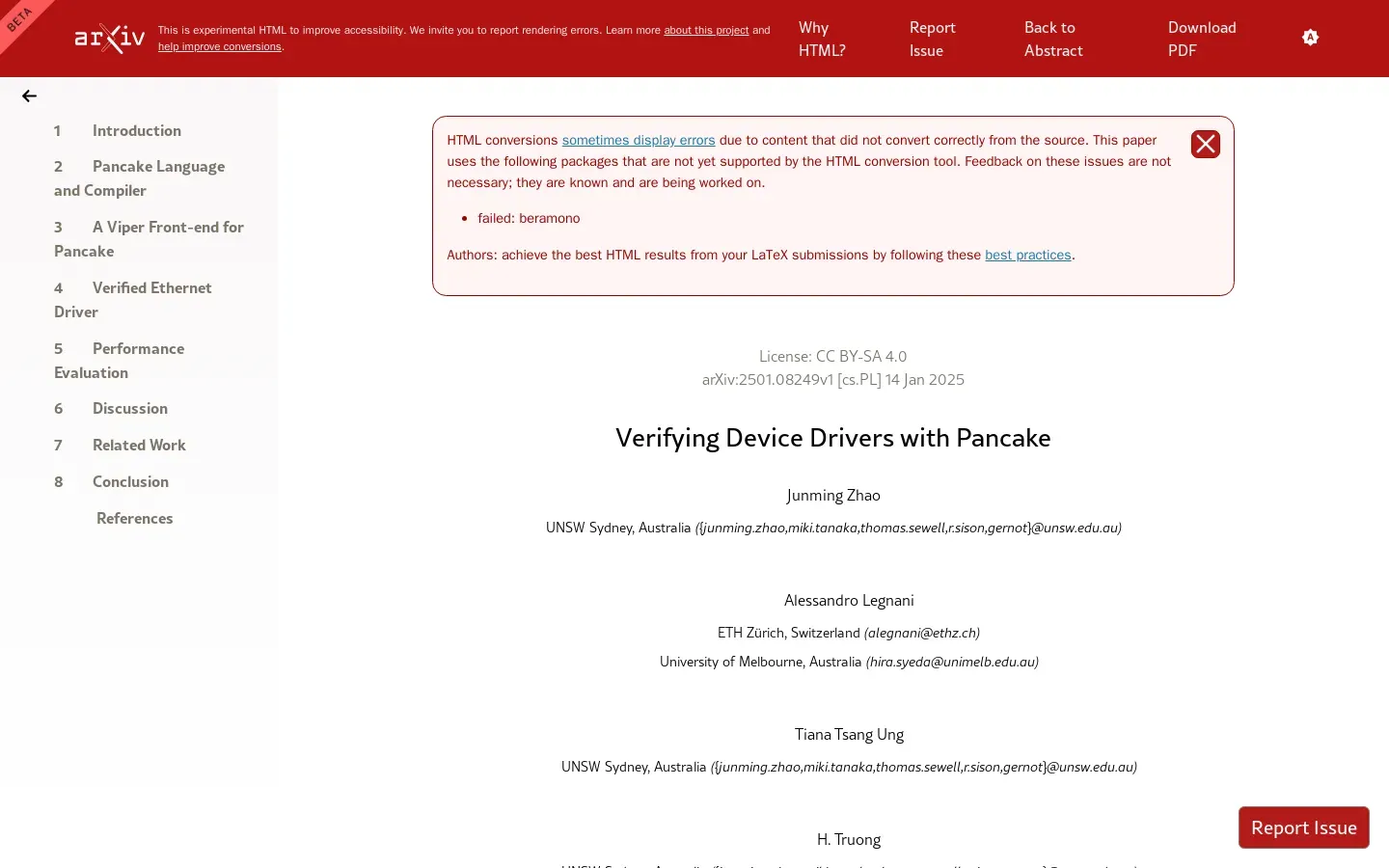
Advancements in Device Driver Verification with Pancake
/ 4 min read
Quick take - Recent research on the Pancake programming language and its integration with the Viper verification framework has led to advancements in cybersecurity by improving the development and verification processes of device drivers, enhancing memory safety, automating vulnerability detection, and enabling formal verification of both new and legacy drivers.
Fast Facts
- Pancake Programming Language: Developed for formal verification of device drivers, enhancing security and reliability in computing environments.
- Automated Vulnerability Detection: Integrates tools for real-time detection and remediation of vulnerabilities, allowing proactive issue resolution.
- Legacy Driver Verification: Capable of verifying outdated drivers, addressing significant security risks associated with legacy code.
- Performance Evaluation: Demonstrated high performance and reduced vulnerabilities compared to existing verification methodologies, enhancing trust in operating systems.
- Future Directions: Focus on IoT integration, real-time verification, advanced security mechanisms, and community collaboration to further improve cybersecurity.
In the ever-evolving landscape of cybersecurity, the integrity of device drivers is critical to maintaining secure computing environments. As our reliance on technology increases, so too does the need for robust mechanisms to ensure that these drivers—often a gateway to deeper system vulnerabilities—are developed and maintained with security in mind. Recent research into the Pancake programming language and its integration with the Viper verification framework offers a promising direction forward, illuminating pathways toward more secure software development practices.
At the heart of this research lies the development of Pancake, which employs automated deductive verification techniques to enhance memory safety and access control within device drivers. These advancements are not merely theoretical; they have practical implications for cybersecurity, especially in systems where device drivers play a pivotal role in overall system integrity. By providing a structured approach to formal verification of both new and legacy drivers, Pancake aims to reduce vulnerabilities that have historically plagued operating systems.
The Viper verification framework further amplifies these efforts by offering an automated front-end capable of detecting and remediating vulnerabilities before they can be exploited. This is particularly relevant as we consider the growing complexity of software ecosystems, where real-time verification in production environments can significantly mitigate risks associated with unverified code. The research indicates that Pancake’s annotations facilitate this process, resulting in enhanced trust in operating systems and their ability to manage shared and device memory effectively.
One of the standout features of this research is its focus on automation and usability. Traditional verification methods often suffer from high overheads, making them impractical for widespread adoption. Yet, Pancake’s design seeks to bridge this gap by promoting secure development practices that can be integrated seamlessly into existing workflows. This shift could lead to a substantial reduction in vulnerabilities across various platforms, including those catering to IoT devices, where security is paramount yet frequently overlooked.
Moreover, the potential for future applications of Pancake extends beyond just enhancing driver security. The framework opens doors for further exploration into protocol compliance, data integrity, and even integration with advanced security mechanisms like machine learning models that can adaptively respond to threats as they emerge. The collaborative contributions from the community surrounding this research will be crucial as it evolves, fostering an environment where shared insights can lead to more refined tools and methodologies.
Despite its strengths, the research does not shy away from acknowledging limitations. For instance, while Pancake shows promise in formal verification of driver properties, there remains a need for continued investigation into real-time systems and their unique challenges. Additionally, performance evaluations suggest that while automated driver verification frameworks can drastically improve security postures, they must also maintain efficiency to avoid impeding system performance.
Looking ahead, the implications of this research are profound. As technology continues to advance at breakneck speed, ensuring that our foundational software components—like device drivers—are rigorously verified will be essential for building resilient systems capable of withstanding emerging cyber threats. The trajectory set by Pancake and Viper not only paves the way for safer operating systems but also cultivates a culture of proactive cybersecurity measures that prioritize verification as a norm rather than an afterthought. In this evolving narrative of cybersecurity resilience, embracing such innovative frameworks could very well define the next frontier in securing our digital infrastructure.



